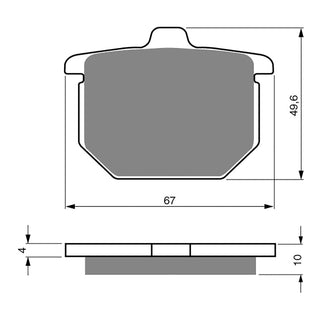GOLDfren began manufacturing sintered disc brake pads for a wide range of off-road and road motorcycles in 1991, nearly three decades on from their first motorcycle brake pads GOLDfren has become one of the largest aftermarket manufacturers in the motorcycle brake disc pad industry. Their development of next-generation products has kept them at the technological forefront of Sintered Friction Braking providing you with confidence in the performance, durability and reliability of your brakes.
S3 Series:
The S3 sintered compound is optimal in dry and wet conditions for road & off-road motorcycles. For the road application, S3 pads are suitable for both the front and rear brake while on off-road applications the S3 is only recommended for the front brake. The S3 series is designed for low abrasive interaction with the rotor and quieter braking due to the ceramic composite material. It has an HH friction rating and performs better at higher temperatures than the AD compound. Friction materials contain metal-ceramic with a bronze-graphite and non-metallic friction additives are spread evenly on the base fine bronze body to achieve optimal friction properties.
Features:
- Very high static friction coefficient
- Minimal difference between wet and dry braking performance
- Good abrasive resistance
- Low abrasive interaction with the brake rotor material
- Longer life compared to organic and Kevlar composite materials
Application:
- For riders who demand a bit more than average from their bikes
- Recommended on both front and rear brakes (road application)
- Can also be used on the front brakes of off-road bikes and ATVs
- Works well on both dry and wet conditions
Operating Parameters:
- Specific pressure: 3.0 Mpa
- Sliding speed: 45 m/s
- Constant maximum temp: 450°C
- Short time maximum temp: 800°C
- Counter-surfaces: steel disks
What is a sintered brake pad?
GOLDfren only manufacturers sintered brake pads that contain metal-ceramic and ceramic-carbon friction materials, these materials allow for less brake dust and a quieter braking experience. Sintered brake pads are made by fusing together metallic particles under high temperature and pressure which enhances friction properties and pad life, resulting in longer life and stronger braking. Sintered brake pads experience no brake fade when operating at high temperatures and in wet conditions. They also last up to 5 times longer than organic pads and provide additional braking strength. All materials used are environmentally friendly and do not contain any lead, asbestos, fibreglass or formaldehyde.
Reminder: one set of brake pads services one brake disc, if you are servicing multiple discs you will need multiple sets of brake pads.
1977 Honda CB750F Super Sport
1978 Honda CB400N
1978 Honda CB750F Super Sport
1978 Honda CBX1000
1979 Honda CB400N
1979 Honda CB750F
1979 Honda CB900F
1979 Honda CBX1000
1979 Honda CX500
1980 Honda CB400N
1980 Honda CB750F
1980 Honda CB900F
1980 Honda CBX1000
1980 Honda CX500
1980 Honda GL1100
1980 Honda GL1100I
1981 Honda CB400N
1981 Honda CB750F
1981 Honda CX500
1981 Honda GL1100
1981 Honda GL1100I
1982 Honda CX500C
GOLDfren began manufacturing sintered disc brake pads for a wide range of off-road and road motorcycles in 1991, nearly three decades on from their first motorcycle brake pads GOLDfren has become one of the largest aftermarket manufacturers in the motorcycle brake disc pad industry. Their development of next-generation products has kept them at the technological forefront of Sintered Friction Braking providing you with confidence in the performance, durability and reliability of your brakes.
S3 Series:
The S3 sintered compound is optimal in dry and wet conditions for road & off-road motorcycles. For the road application, S3 pads are suitable for both the front and rear brake while on off-road applications the S3 is only recommended for the front brake. The S3 series is designed for low abrasive interaction with the rotor and quieter braking due to the ceramic composite material. It has an HH friction rating and performs better at higher temperatures than the AD compound. Friction materials contain metal-ceramic with a bronze-graphite and non-metallic friction additives are spread evenly on the base fine bronze body to achieve optimal friction properties.
Features:
- Very high static friction coefficient
- Minimal difference between wet and dry braking performance
- Good abrasive resistance
- Low abrasive interaction with the brake rotor material
- Longer life compared to organic and Kevlar composite materials
Application:
- For riders who demand a bit more than average from their bikes
- Recommended on both front and rear brakes (road application)
- Can also be used on the front brakes of off-road bikes and ATVs
- Works well on both dry and wet conditions
Operating Parameters:
- Specific pressure: 3.0 Mpa
- Sliding speed: 45 m/s
- Constant maximum temp: 450°C
- Short time maximum temp: 800°C
- Counter-surfaces: steel disks
What is a sintered brake pad?
GOLDfren only manufacturers sintered brake pads that contain metal-ceramic and ceramic-carbon friction materials, these materials allow for less brake dust and a quieter braking experience. Sintered brake pads are made by fusing together metallic particles under high temperature and pressure which enhances friction properties and pad life, resulting in longer life and stronger braking. Sintered brake pads experience no brake fade when operating at high temperatures and in wet conditions. They also last up to 5 times longer than organic pads and provide additional braking strength. All materials used are environmentally friendly and do not contain any lead, asbestos, fibreglass or formaldehyde.
Reminder: one set of brake pads services one brake disc, if you are servicing multiple discs you will need multiple sets of brake pads.
1977 Honda CB750F Super Sport
1978 Honda CB400N
1978 Honda CB750F Super Sport
1978 Honda CBX1000
1979 Honda CB400N
1979 Honda CB750F
1979 Honda CB900F
1979 Honda CBX1000
1979 Honda CX500
1980 Honda CB400N
1980 Honda CB750F
1980 Honda CB900F
1980 Honda CBX1000
1980 Honda CX500
1980 Honda GL1100
1980 Honda GL1100I
1981 Honda CB400N
1981 Honda CB750F
1981 Honda CX500
1981 Honda GL1100
1981 Honda GL1100I
1982 Honda CX500C


